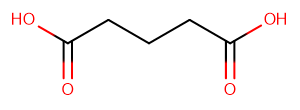
Glutaric acid
CAS No. 110-94-1
Glutaric acid ( —— )
产品货号. M19551 CAS No. 110-94-1
Glutaric acid is a simple five-carbon linear dicarboxylic acid. Glutaric acid is naturally produced in the body during the metabolism of some amino acids including lysine and tryptophan. Glutaric acid may cause irritation to the skin and eyes. When present in sufficiently high levels glutaric acid can act as an acidogen and a metabotoxin.
纯度: >98% (HPLC)
 COA
COA
 Datasheet
Datasheet
 HNMR
HNMR
 HPLC
HPLC
 MSDS
MSDS
 Handing Instructions
Handing Instructions
| 规格 | 价格/人民币 | 库存 | 数量 |
| 100MG | ¥365 | 有现货 |


|
| 200MG | 获取报价 | 有现货 |


|
| 500MG | 获取报价 | 有现货 |


|
| 1G | 获取报价 | 有现货 |


|
生物学信息
-
产品名称Glutaric acid
-
注意事项本公司产品仅用于科研实验,不得用于人体或动物的临床与诊断
-
产品简述Glutaric acid is a simple five-carbon linear dicarboxylic acid. Glutaric acid is naturally produced in the body during the metabolism of some amino acids including lysine and tryptophan. Glutaric acid may cause irritation to the skin and eyes. When present in sufficiently high levels glutaric acid can act as an acidogen and a metabotoxin.
-
产品描述Glutaric acid is a simple five-carbon linear dicarboxylic acid. Glutaric acid is naturally produced in the body during the metabolism of some amino acids including lysine and tryptophan. Glutaric acid may cause irritation to the skin and eyes. When present in sufficiently high levels glutaric acid can act as an acidogen and a metabotoxin. An acidogen is an acidic compound that induces acidosis which has multiple adverse effects on many organ systems. A metabotoxin is an endogenously produced metabolite that causes adverse health effects at chronically high levels. Chronically high levels of glutaric acid are associated with at least three inborn errors of metabolism including glutaric aciduria type I malonyl-CoA decarboxylase deficiency and glutaric aciduria type III. Glutaric aciduria type I (glutaric acidemia type I glutaryl-CoA dehydrogenase deficiency GA1 or GAT1) is an inherited disorder in which the body is unable to completely break down the amino acids lysine hydroxylysine and tryptophan due to a deficiency of mitochondrial glutaryl-CoA dehydrogenase (EC 1.3.99.7 GCDH). Excessive levels of their intermediate breakdown products (e.g. glutaric acid glutaryl-CoA 3-hydroxyglutaric acid glutaconic acid) can accumulate and cause damage to the brain (and also other organs). Babies with glutaric acidemia type I are often born with unusually large heads (macrocephaly). Macrocephaly is amongst the earliest signs of GA1. GA1 also causes secondary carnitine deficiency because glutaric acid like other organic acids is detoxified by carnitine. Abnormally high levels of organic acids in the blood (organic acidemia) urine (organic aciduria) the brain and other tissues lead to general metabolic acidosis.
-
同义词——
-
通路Proteasome/Ubiquitin
-
靶点Endogenous Metabolite
-
受体Endogenous Metabolite
-
研究领域——
-
适应症——
化学信息
-
CAS Number110-94-1
-
分子量132.11
-
分子式C5H8O4
-
纯度>98% (HPLC)
-
溶解度DMSO: 10 mM;Water:5 mg/mL;Ethanol: Soluble
-
SMILESOC(=O)CCCC(O)=O
-
化学全称——
运输与储存
-
储存条件(-20℃)
-
运输条件With Ice Pack
-
稳定性≥ 2 years
参考文献
1.Bishop FS et al. Glutaric aciduria type 1 presenting as bilateral subdural hematomas mimicking nonaccidental trauma. Case report and review of the literature. J Neurosurg. 2007 Mar;106(3 Suppl):222-6.
产品手册




关联产品
-
trans-Aconitic acid
Trans-Aconitic acid is normally present in normal human urine and it has been suggested that is present in larger amounts with Reye's syndrome and organic aciduria.
-
p-Toluic Acid
p-Toluic Acid belongs to the class of organic compounds known as benzoic acids. 4-Methylbenzoic acid has been primarily detected in saliva.
-
Oxaloacetic acid
Oxaloacetic acid also known as oxosuccinic acid or oxalacetic acid is a four-carbon dicarboxylic acid appearing as an intermediate of the citric acid cycle.



 021-51111890
021-51111890 购物车()
购物车()
 sales@molnova.cn
sales@molnova.cn







